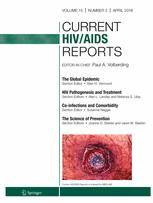Posted on June 02, 2017
Source: Current HIV/AIDS Reports

Mary Soliman, Geetha Srikrishna, Ashwin Balagopal
Purpose of Review
HIV-1 infection is of global importance, and still incurs substantial morbidity and mortality. Although major pharmacologic advances over the past two decades have resulted in remarkable HIV-1 control, a cure is still forthcoming. One approach to a cure is to exploit natural mechanisms by which the host restricts HIV-1. Herein, we review past and recent discoveries of HIV-1 restriction factors, a diverse set of host proteins that limit HIV-1 replication at multiple levels, including entry, reverse transcription, integration, translation of viral proteins, and packaging and release of virions.
Recent Findings
Recent studies of intracellular HIV-1 restriction have offered unique molecular insights into HIV-1 replication and biology. Studies have revealed insights of how restriction factors drive HIV-1 evolution. Although HIV-1 restriction factors only partially control the virus, their importance is underscored by their effect on HIV-1 evolution and adaptation.
Summary
The list of host restriction factors that control HIV-1 infection is likely to expand with future discoveries. A deeper understanding of the molecular mechanisms of regulation by these factors will uncover new targets for therapeutic control of HIV-1 infection.